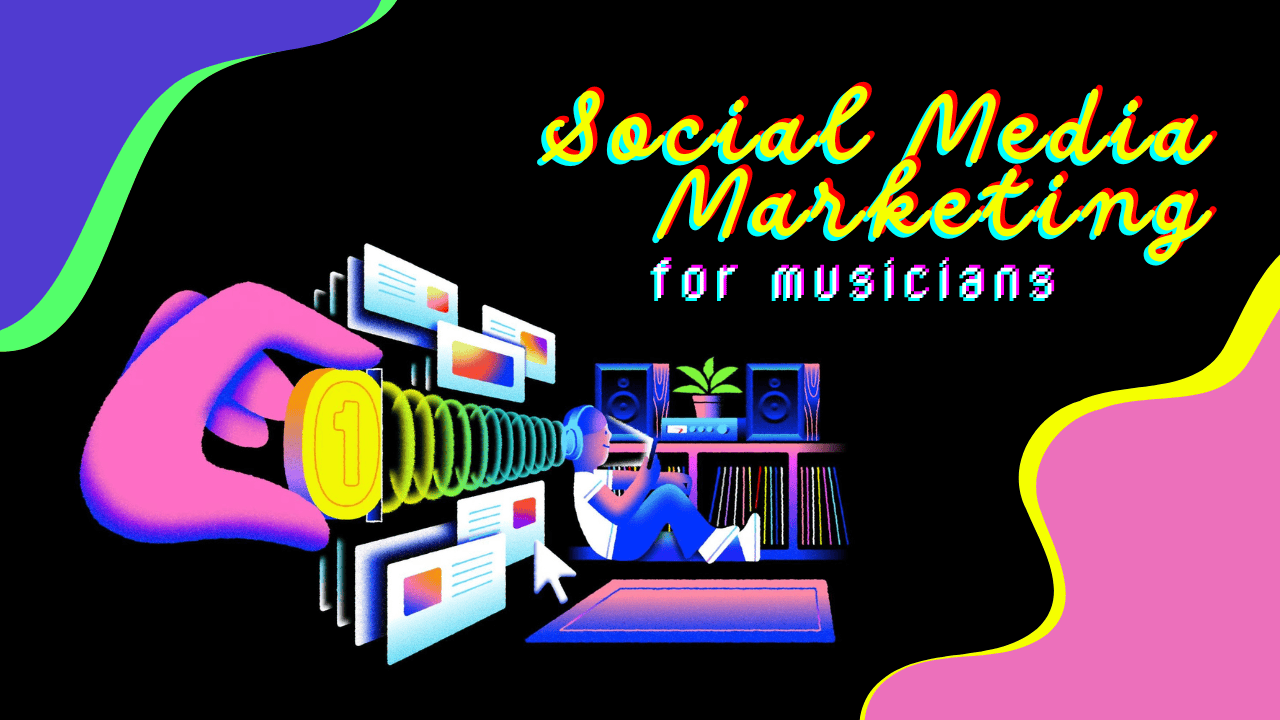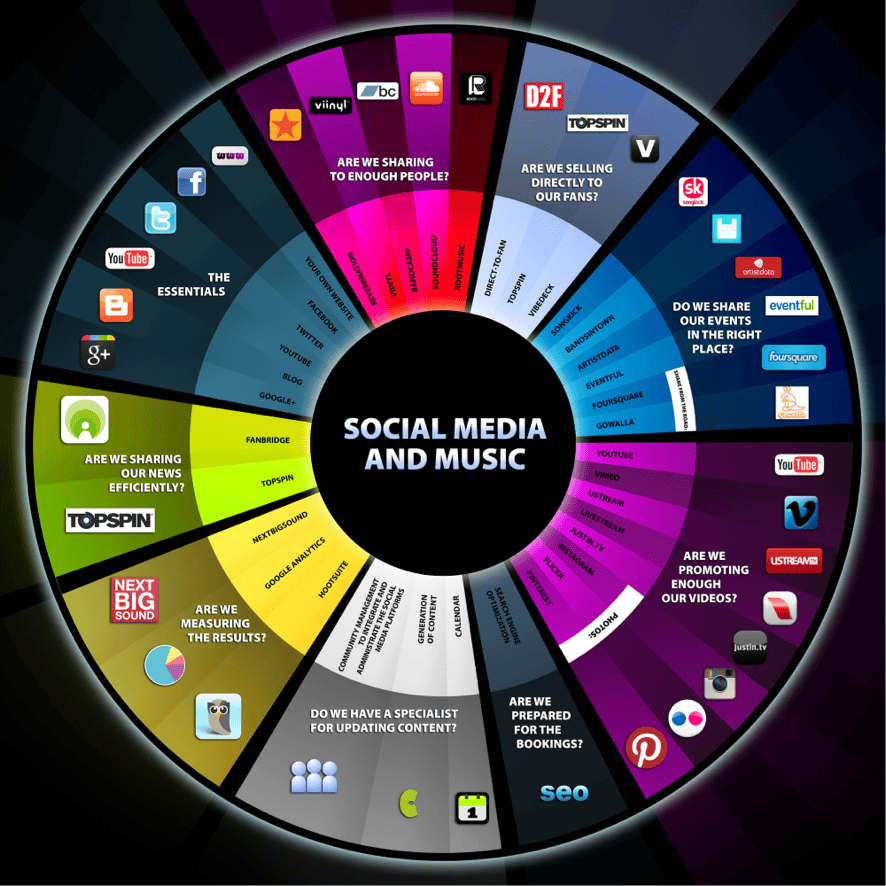Social media is a powerful tool for musicians to grow their audience. However, it can be challenging to stand out among many others trying to do the same. How can you get noticed? Our guide gives essential tips to help you on your journey on social media marketing for musicians. Ready? Let’s get started.
1. Take social media seriously
You’ve probably heard before how important social media is for promoting your music. It helps you get gigs and other opportunities.
Make sure to:
- Have profiles on all major platforms.
- Use attractive profile and header images.
- Write bios that show who you are as an artist.
- Use link-in-bio tools to connect all your online accounts.
- Clearly share gig dates, release dates, and important info.
- Engage genuinely with your followers.
Social media isn’t just about building an audience; it connects you with other artists, sparking collaborations and inspiration. It’s also a creative outlet for showcasing your music in unique ways.
Consistently using social media keeps you motivated and helps you grow your fanbase and skills. Just approach it with the right mindset.
2. But not too seriously
That said, here’s a nuanced perspective to help you maintain a balanced approach with these social media marketing for musicians tools.
Remember, social media shouldn’t dominate your life as a musician. It’s not the only factor for success.
Besides focusing on creating and sharing good music consistently, prioritize booking gigs.
A strong social media presence matters for gig opportunities today, but so do real-life connections in your local music scene. Filling a local venue is more valuable than scattered social media likes from different places.
If your local music scene isn’t active, our social media tips could be especially helpful. But if social media starts taking more time than your music, it’s important to rebalance.
3. Understand your audience
Using social media effectively means knowing who your audience is. But what does that really mean?
You can use social media and streaming stats to see their age, gender, where they live, and more. While these details are useful, it’s also smart to connect with your audience on a personal level. Your audience is basically the music community you’re part of (or want to join). Your ideal listener loves your music and stays interested in you over time. To find and keep these fans, get involved in your music scene—online or in person.
Many musicians naturally attract fans by making music they love. Social media can help you do this more intentionally. You’ll learn about your fans’ interests and culture— who they follow, what posts they like, their sense of humor, and other interests. Stay connected with your music community, notice the details, and let them inspire your music and how you present yourself.
Which brings us to…
4. Know yourself
Figuring out how to show yourself and your music is one of the hardest parts of being a musician. Some find it exciting to create a special and steady image that connects with people. Others might feel uneasy about ‘branding.’ They’d rather focus on music than on how they look.
No matter where you stand, one thing is clear—your music’s image matters. You can approach it with honesty, creativity, and care.
- What art, design, or photos match your music best?
- What vibe does your music give off?
- What themes do your lyrics explore?
- How can you bring your unique personality into your music and online presence?
As you think about these things, you can build a unique identity across all platforms.
Then, social media can help you share that identity and make your music shine.
5. Stay consistent
How often should you post on social media?
Some suggest specific numbers, like 2–4 posts and 2–5 Instagram stories daily. But it’s more flexible than that. You don’t want to overwhelm followers with forgettable posts. Plus, focusing too much on posting can tire you out and distract from your music.
Still, being consistent matters. Posting sporadically won’t keep people interested. Finding the right posting frequency takes time and testing. Watch successful musicians in your genre. See how often they post. You might learn a lot just by watching.
6. Use short videos wisely
From TikTok to Shorts and Reels, short videos rule social media now.
It’s smart to use them to promote your music and show off your creativity.
There are lots of ways to do this—music videos, snippets with visuals, studio talks, live performances, and more. But remember, each platform has its own style and trends. What works on TikTok might not work the same on Shorts or Reels.
Different topics trend at different times too. So, don’t just post the same thing everywhere. Study what gets likes and shares in your music world, and tailor your posts to fit each platform. This way, your videos will connect better with your fans.
7. Connect social media and streaming
Is streaming like social media?
We say yes—it’s where people connect through music. And streaming ties closely with social media for musicians. Link your streaming and social media so fans can find you everywhere. This is key when promoting new music.
Ask followers to listen, like, and add your songs. Early plays help boost your music’s visibility on streaming platforms. They can also improve chances to get on Spotify playlists. If your music isn’t on Spotify yet, use a reliable distributor.
8. Work together by tagging and sharing posts
Connecting with your music scene and the broader community is crucial.
When appropriate, tag other profiles like artists, labels, promoters, brands, and venues.
This helps more people discover your profile who aren’t following you yet.
Additionally, if you’re collaborating or partnering with others, use Instagram collab posts.
This expands your audience and boosts your credibility online by making meaningful connections in public.
9. Try sponsored posts
Some musicians spend a lot on sponsored social media content to get ahead in advertising. If you can’t do this now, don’t worry.
Many musicians use social media to gain fans without spending on ads. If you have a moderate budget, even small ad campaigns can help attract new followers and listeners.
This is especially true for promoting new music. Facebook and Instagram ads can fit any budget, targeting potential fans by location and music preferences. Effective targeting brings the right audience to your music, leading to more loyal fans in the long run.
10. Take breaks (yes, you can do that)
You don’t hear this advice often, maybe because everyone talks about posting regularly and standing out in everyone’s feeds.
But we believe it’s important. Too much time on social media can drain your energy from creating music.
That’s why it’s crucial to take planned breaks to focus on your music and daily life. It could be a few days, a whole week, or longer, depending on your fanbase and needs.
If you’re worried about losing momentum, time your breaks after busy promotional periods. Release new music, promote it for a few weeks, then take a week off social media. Let your release settle and attract new listeners and fans.
However you decide, we suggest making it part of your plan. Your personal connection with your music is your most valuable asset as an artist. It’s more important than having lots of followers or social media buzz.
Social media marketing for musicians should enhance your music, not overshadow it.


